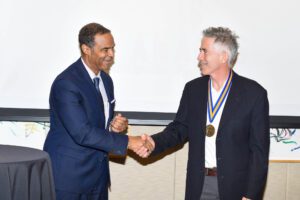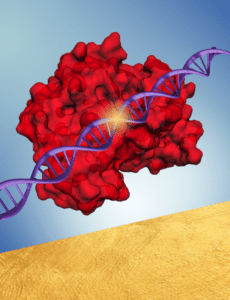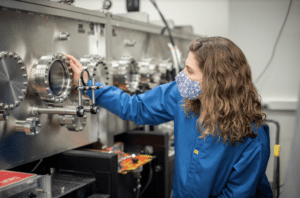Known affectionately as “The Sh*tty Project,” Codling, an ECE PhD student, monitors the vibrations in pig pens to track the health of the piglets and predict when they’re in danger.


Known affectionately as “The Sh*tty Project,” Codling, an ECE PhD student, monitors the vibrations in pig pens to track the health of the piglets and predict when they’re in danger.

Wei Lu talked about his innovations as the 2022 Distinguished University Innovator, followed by a panel discussion about the University’s role in fueling new high tech companies in the area.

Flynn is one of the world’s premier scholars of analog and mixed-signal integrated circuits and systems, analog-to-digital conversion (ADC), and other interface circuits.
Prof. Zetian Mi’s team are the first to achieve high-performance, highly stable green micro-LEDs with dimensions less than 1 micrometer on silicon, which can support ultrahigh-resolution full-color displays and other applications.
The post Breakthrough in green micro-LEDs for augmented/mixed reality devices appeared first on Michigan Engineering News.
New technique could enable processing speeds a million to a billion times faster than today’s computers and spur progress in many-body physics.
The post Seeing electron movement at fastest speed ever could help unlock next-level quantum computing appeared first on Michigan Engineering News.
The CHIPS and Science Act of 2022 promises to revitalize the U.S. semiconductor industry. Dennis Sylvester offers his perspective on what it means for ECE.
The post CHIPS and Science Act: Implications and opportunities appeared first on Michigan Engineering News.

Prof. Somin Lee and her research group developed a way to reduce trial and error in gene editing by getting a look at the process in real time

The ZEUS laser at the University of Michigan has begun its commissioning experiments
The hectoSTAR probe, with 128 stimulating micro-LEDs and 256 recording electrodes integrated in the same neural probe, was designed for some stellar brain mapping projects
The post Next generation neural probe leads to expanded understanding of the brain appeared first on Michigan Engineering News.

As a member of the X-lites program, ZEUS joins an international community of extreme light labs working together to advance laser science for the benefit of society